The goverment’s test, track and trace system is “not fit for purpose” and Britain will not recover economically from the Covid-19 crisis unless a radical new approach is taken to it, an eminent independent group of scientists has warned.
It will be “impossible” under the centralised system introduced by Matt Hancock and hailed as ‘world beating’ by Boris Johnson to trace and isolate enough at-risk people to eliminate coronavirus, said the Independent Sage group led by the government’s former chief scientific adviser David King.
And the group warned that the “erosion of trust” in government over recent weeks – particularly among ethnic minority communities – is likely to undermine compliance with the scheme, which relies on those identified as contacts of infected people voluntarily self-isolating for 14 days.
Download the new Independent Premium app
Sharing the full story, not just the headlines
An effective test and trace programme is “essential if we are to recover our economy, protect livelihoods and secure longer‐term well-being and health provision for all”, said the report, pointedly concluding that this “is clearly not happening” now.
Crucially, it said that a successful test and trace system must provide people identified as contacts with facilities to self-isolate, support with food and money and guarantees from employers that they can return to work, so that they will feel ready to accept restrictions on their movements for a fortnight.
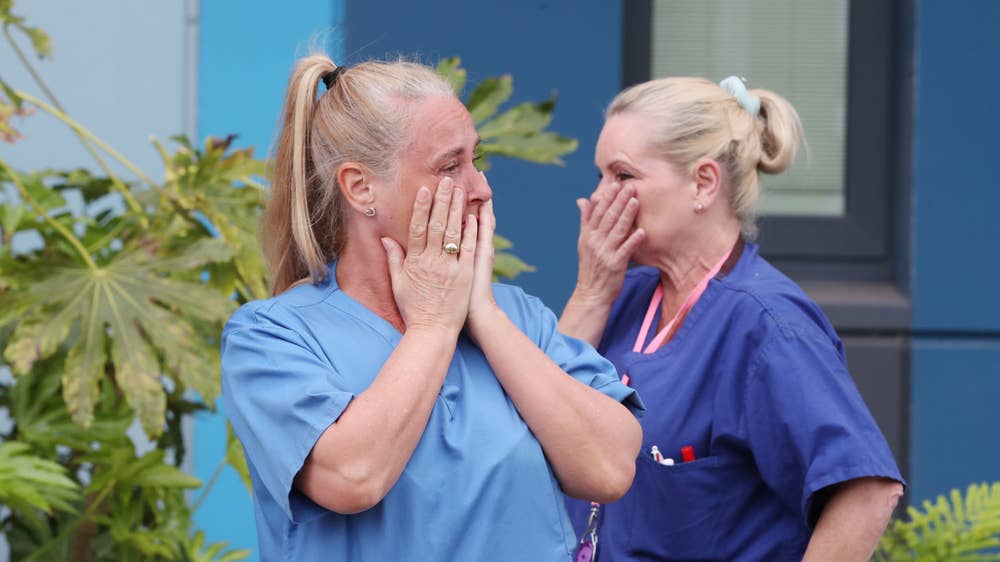
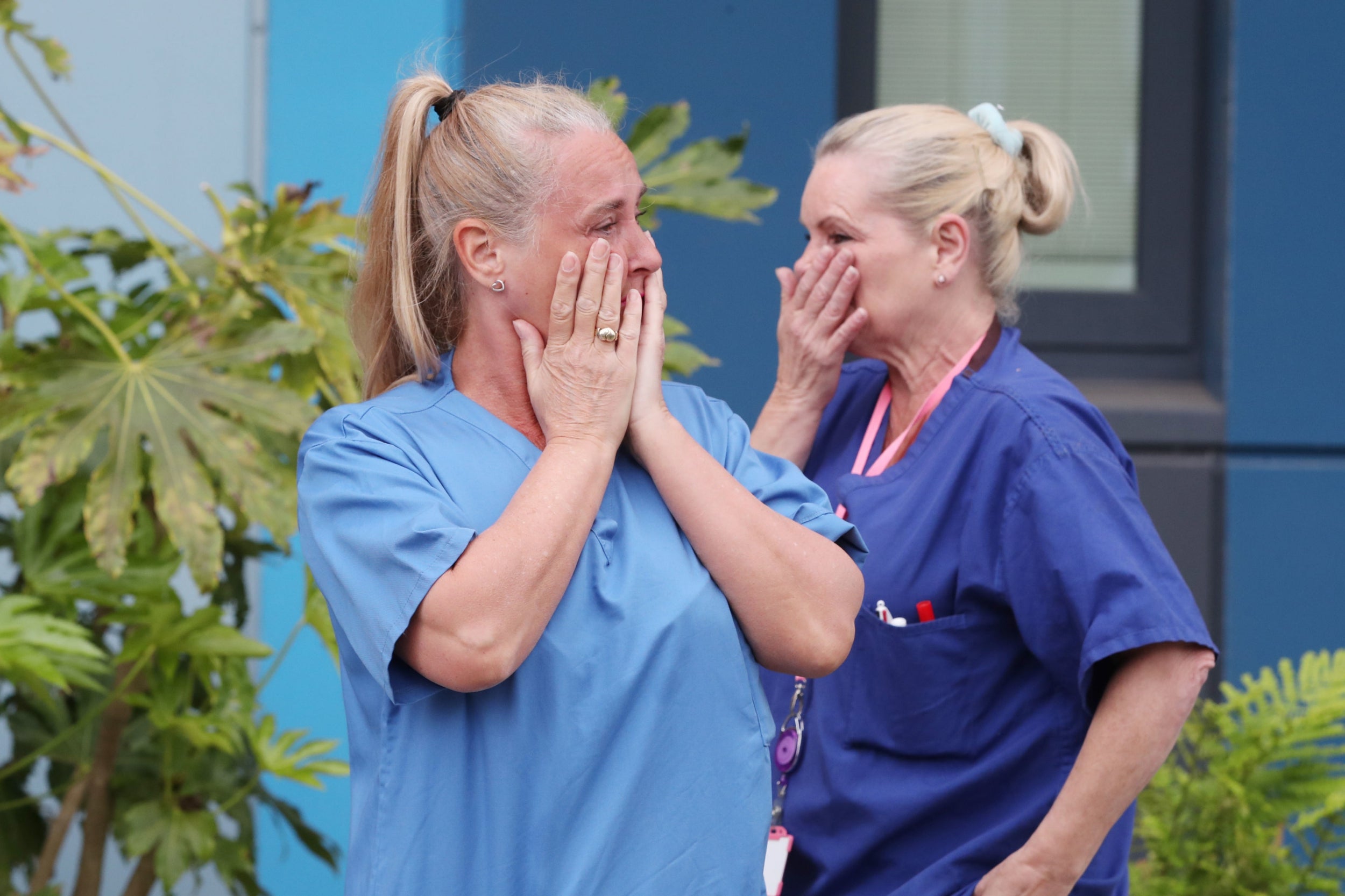
1/30
Staff react outside Salford Royal Hospital in Manchester during a minute’s silence to pay tribute to the NHS staff and key workers who have died during the coronavirus outbreak
PA

2/30
Staff inside Camberwell bus depot in London, during a minute’s silence
PA
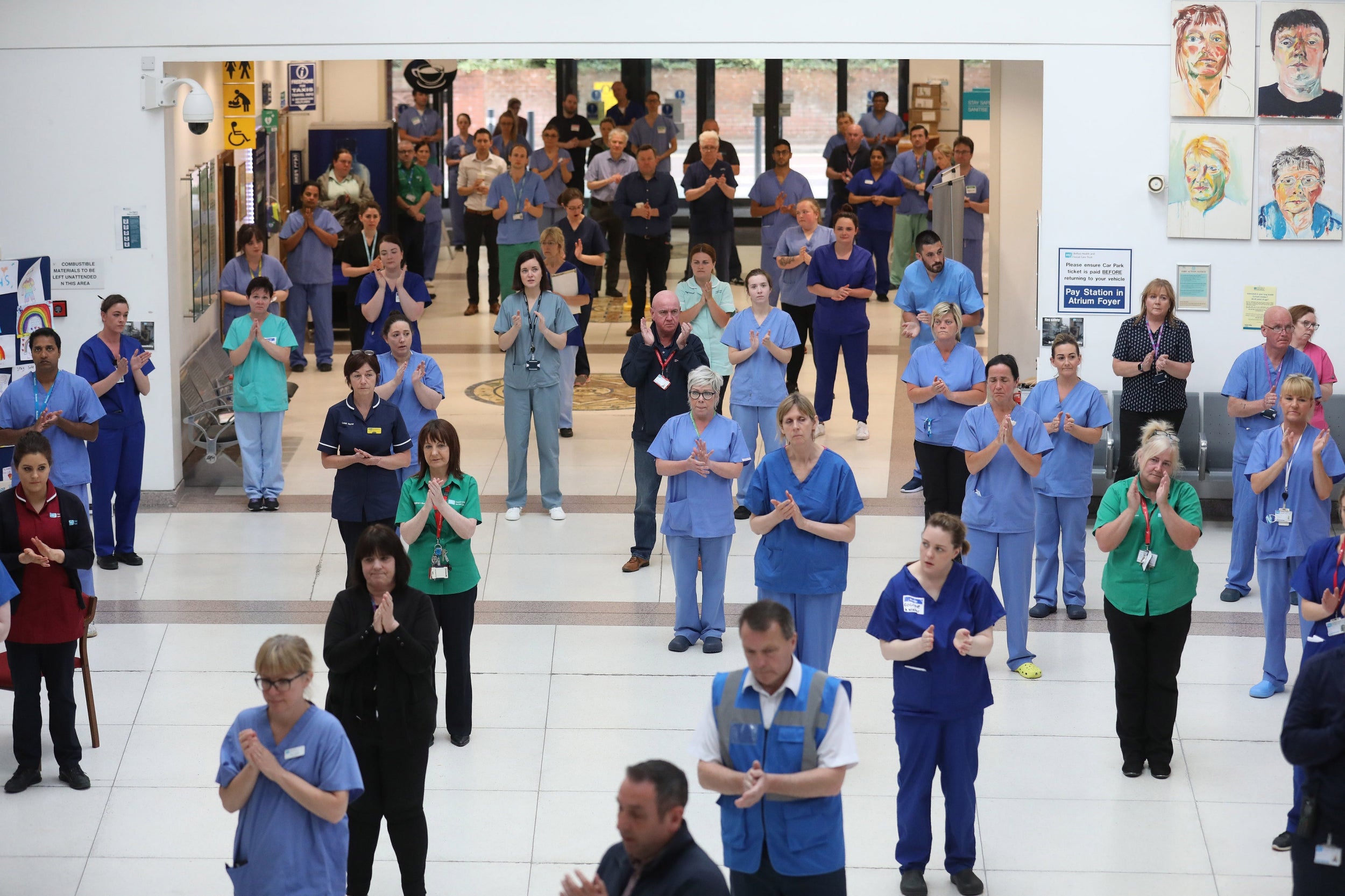
3/30
NHS staff at the Mater hospital in Belfast, during a minute’s silence to pay tribute to the NHS staff and key workers who have died during the coronavirus outbreak.
PA

4/30
Shoppers observe a minute’s silence in Tescos in Shoreham
Getty

5/30
Firefighters outside Godstone fire station
PA
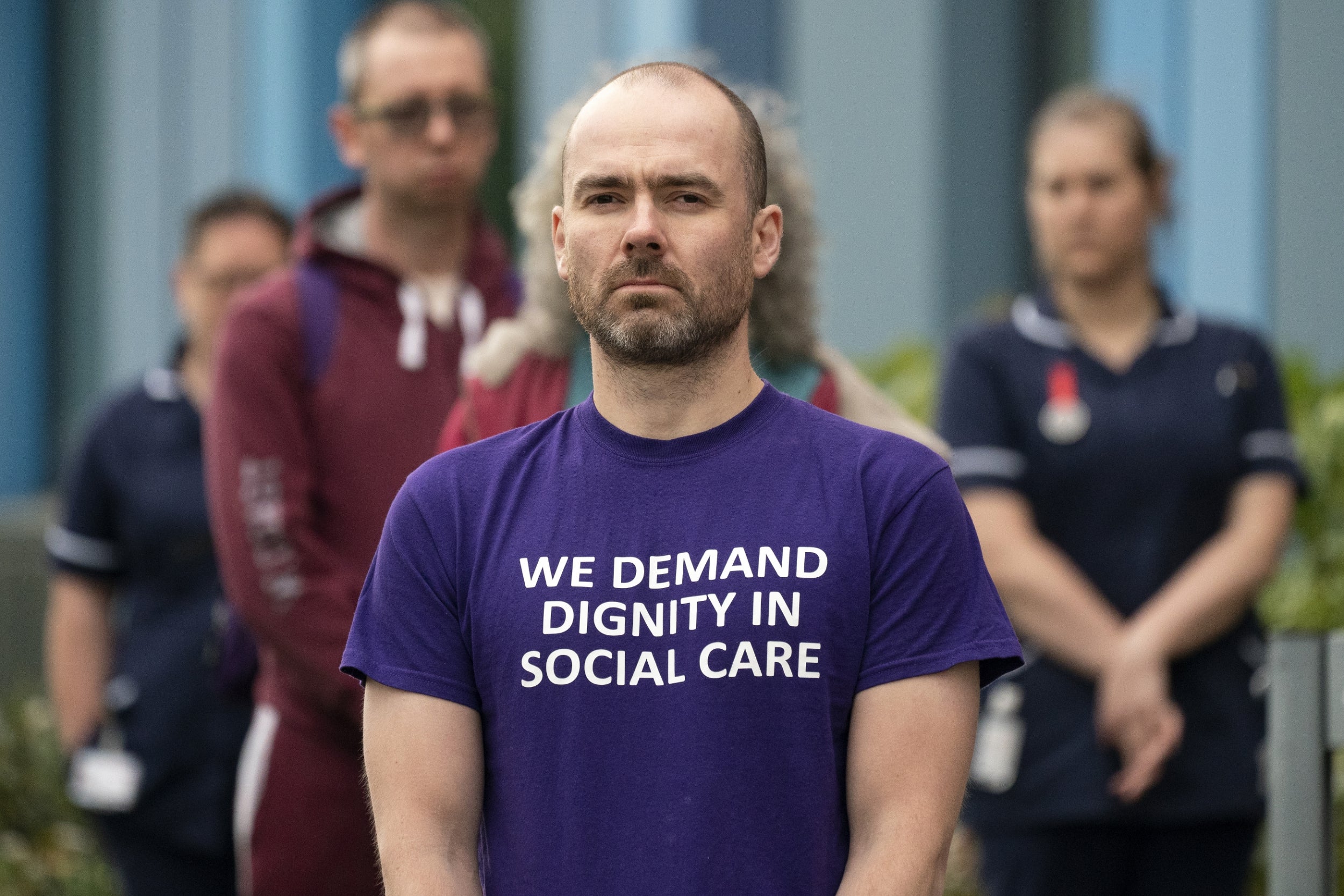
6/30 Salford Royal Hospital
Getty
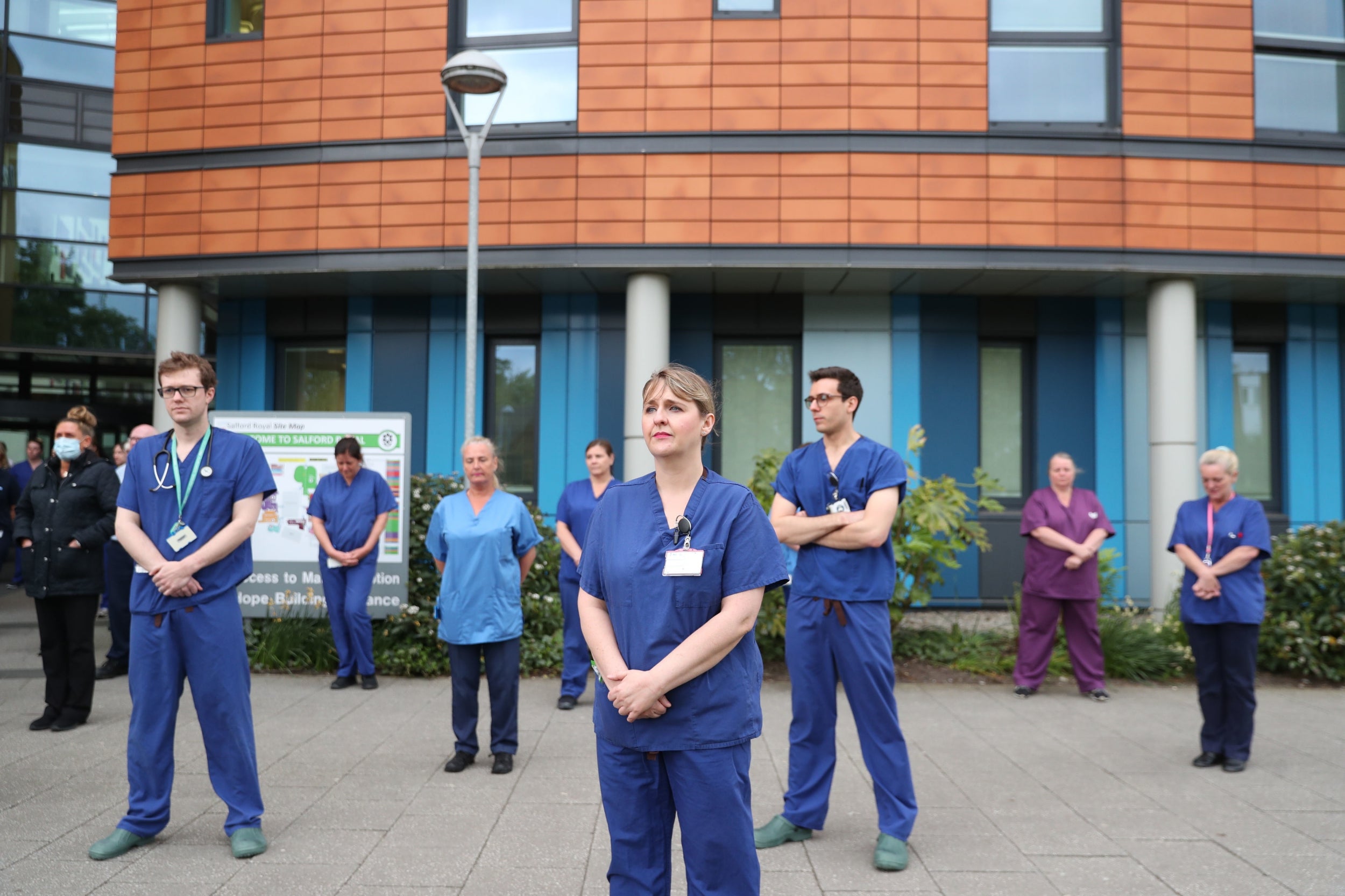
7/30 Salford Royal Hospital
PA
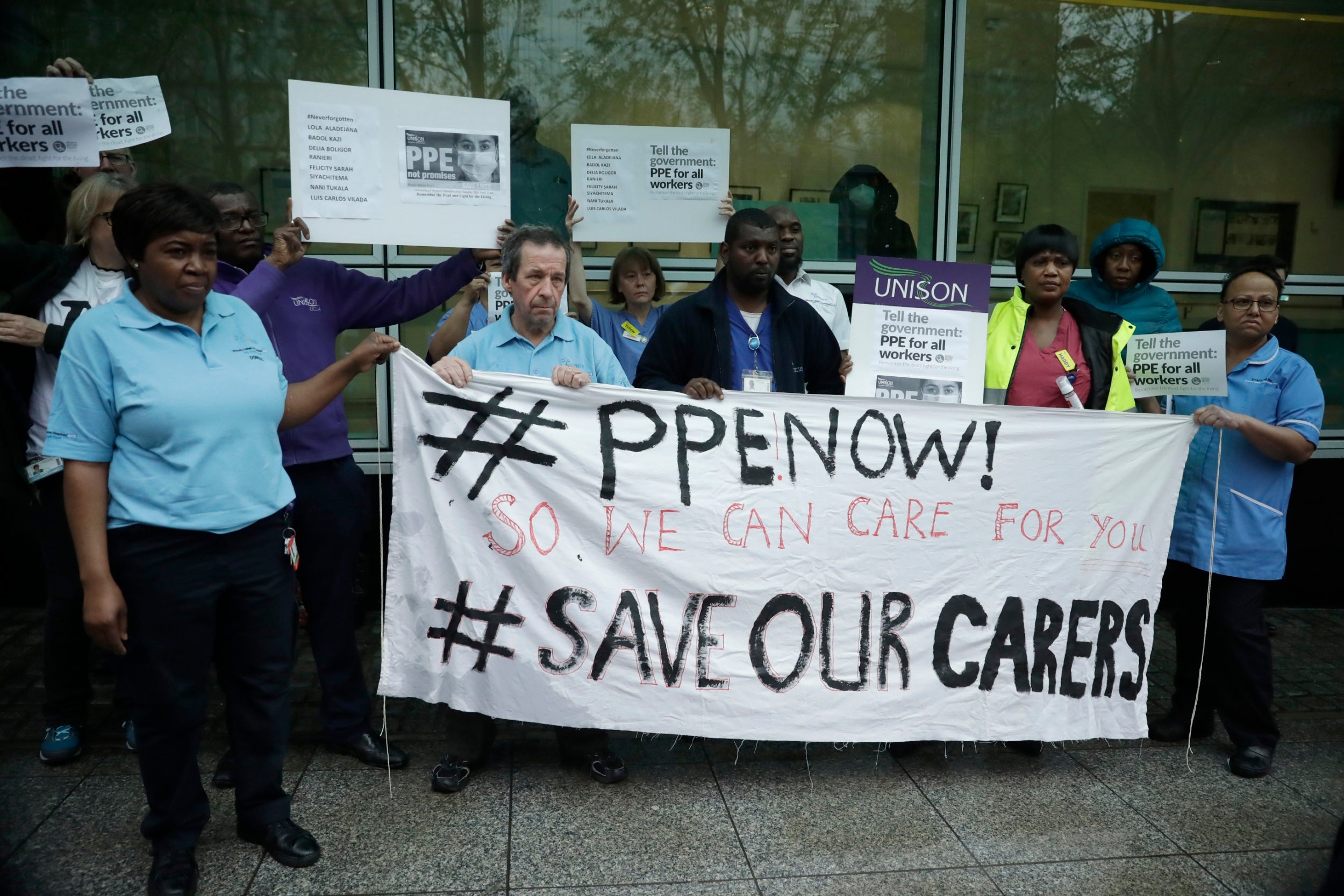
8/30
Hospital workers take part in a protest calling on the British government to provide PPE across Britain for all workers in care, the NHS and other vital public services after a nationwide minute’s silence at University College Hospital in London
AP

9/30
A school children’s poster hanging outside Glenfield Hospital during a minute’s silence
Getty
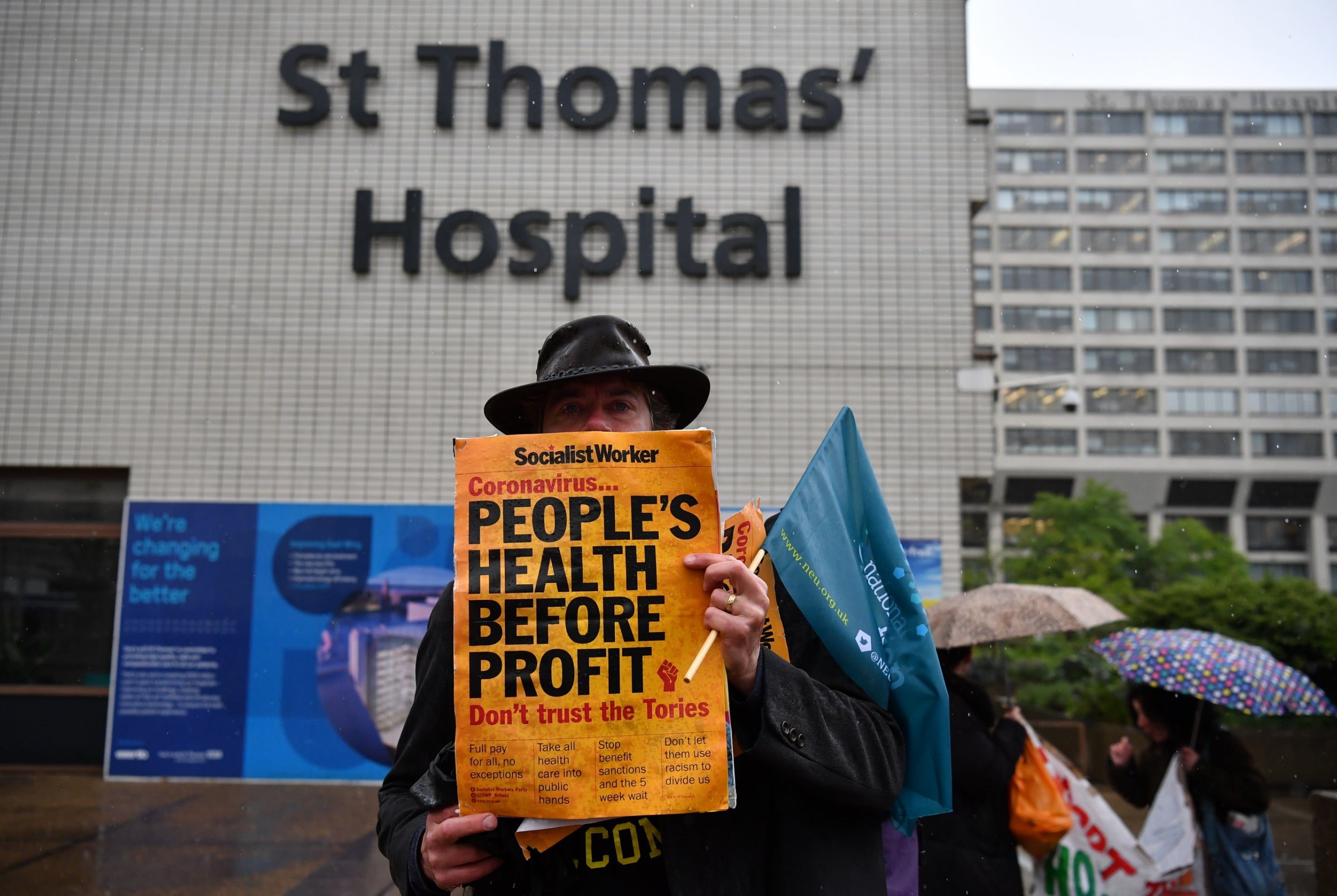
10/30
A man holds a placard that reads “People’s health before profit” outside St Thomas hospital
Getty
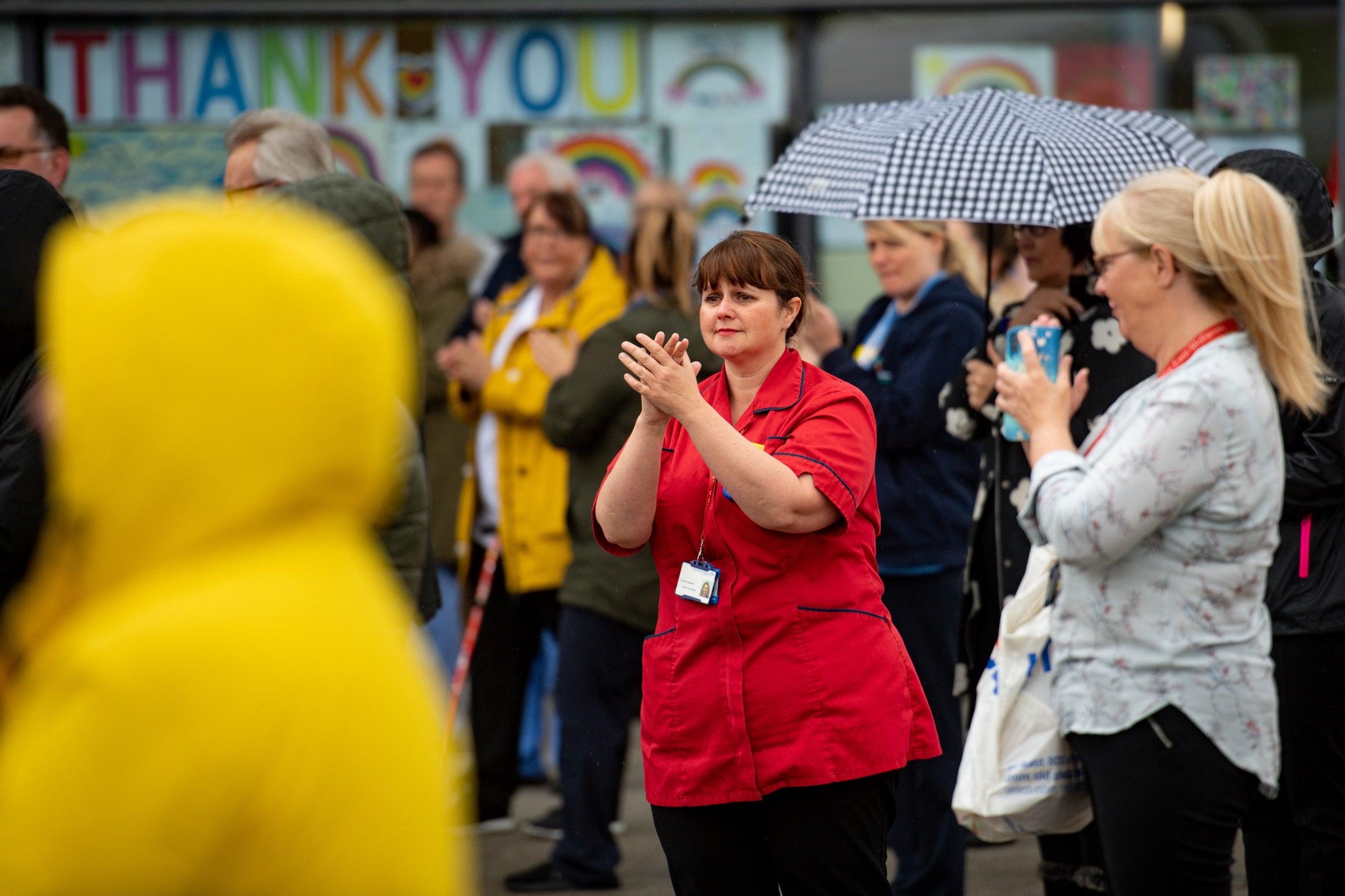
11/30
Staff members applaud outside the Royal Derby Hospital, following a minute’s silence
PA
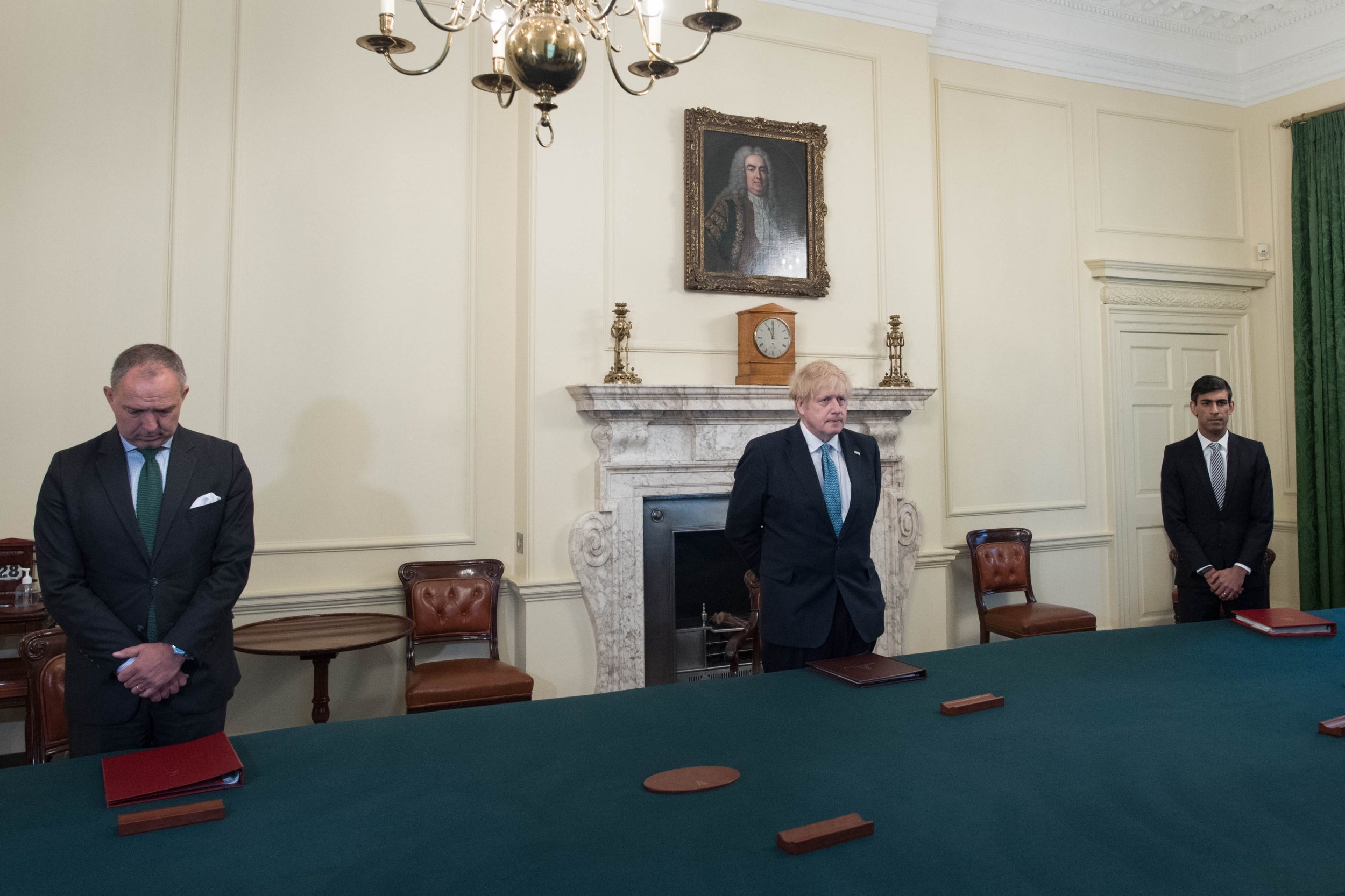
12/30
Cabinet Secretary Mark Sedwill, Prime minister Boris Johnson and Chancellor of the Exchequer Rishi Sunak, stand inside 10 Downing Street, London, to observe a minutes silence in tribute to the NHS staff and key workers who have died during the coronavirus outbreak
PA
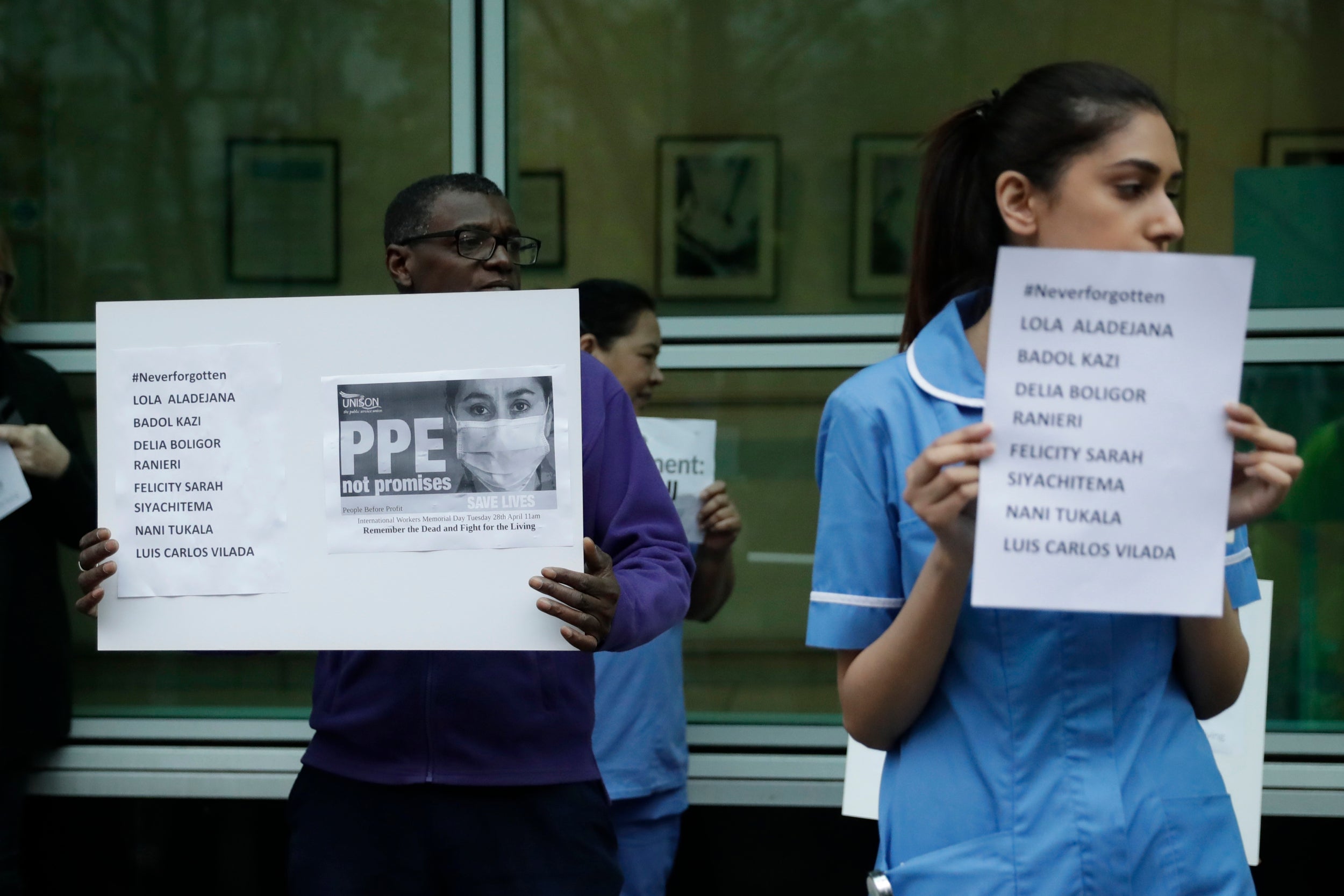
13/30 University College Hospital, London
Hospital workers hold placards with the names of their colleagues who have died from coronavirus as they take part in a protest calling on the British government to provide PPE
AP
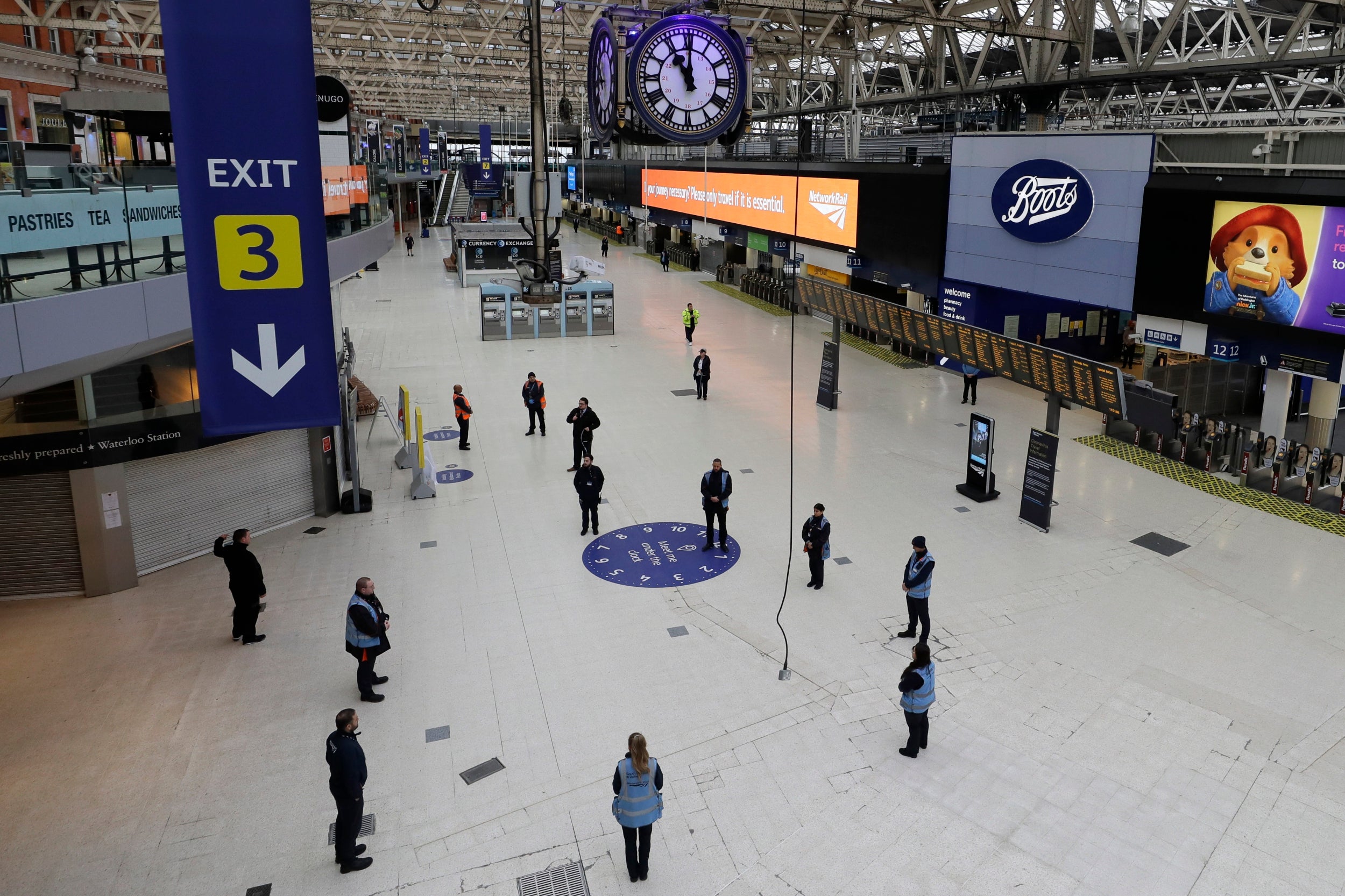
14/30
Staff at Waterloo Station in London, stand to observe a minute’s silence, to pay tribute to NHS and key workers who have died with coronavirus
AP
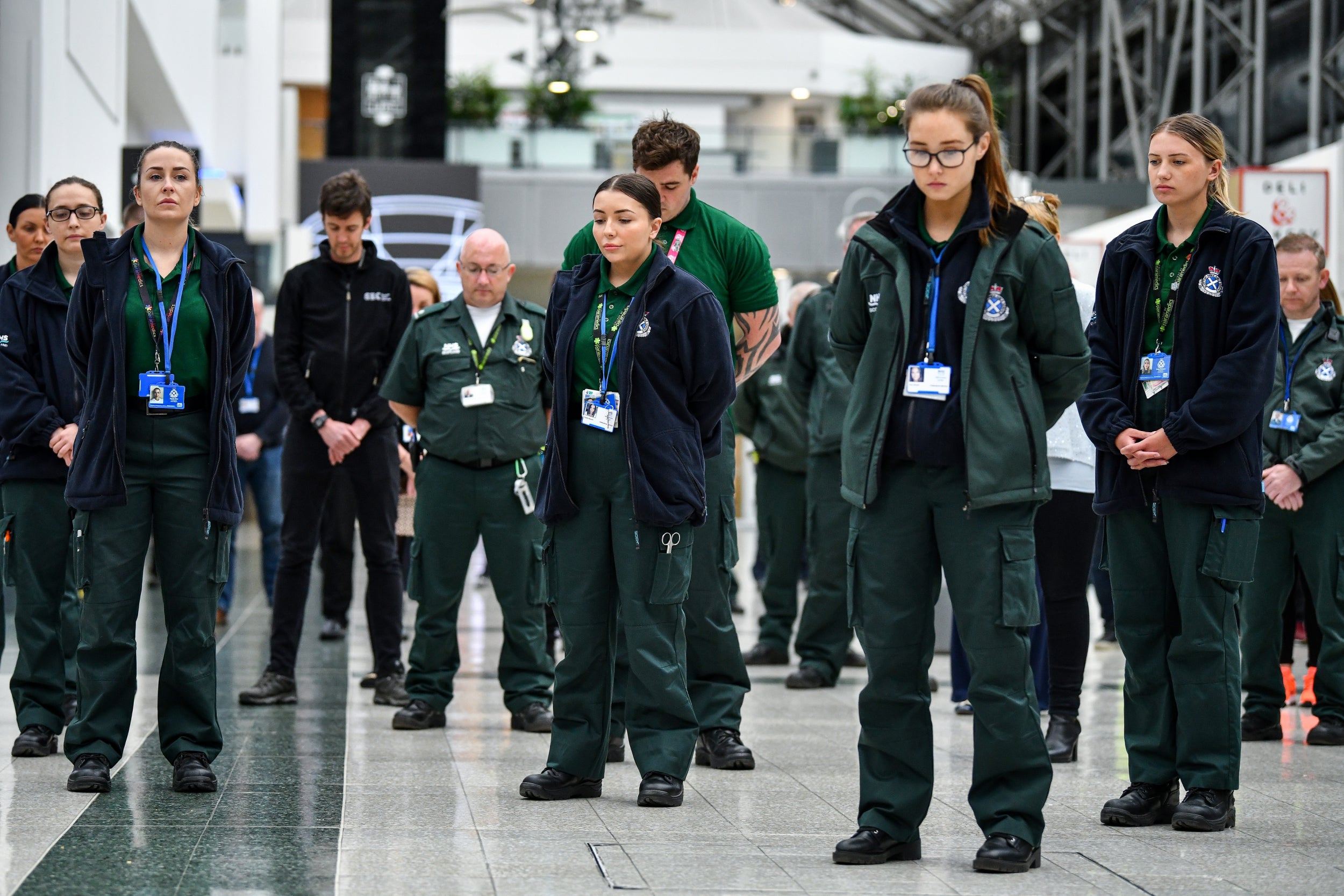
15/30
Medical staff at the Louisa Jordan hospital stand during a UK wide minutes silence to commemorate the key workers who have died with coronavirus in Glasgow
Getty
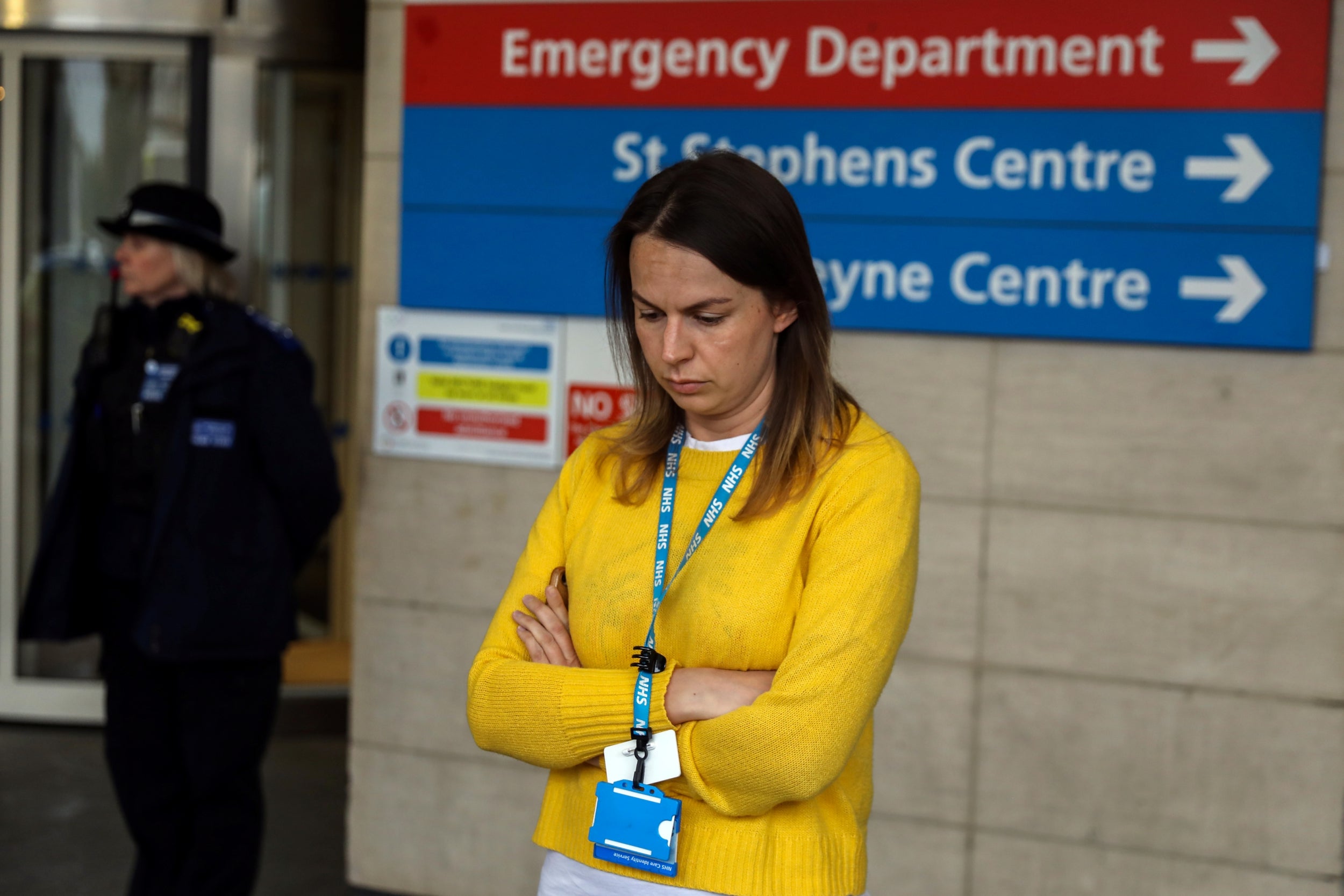
16/30 London
An NHS worker observes a minute’s silence at Chelsea and Westminster Hospital
Reuters
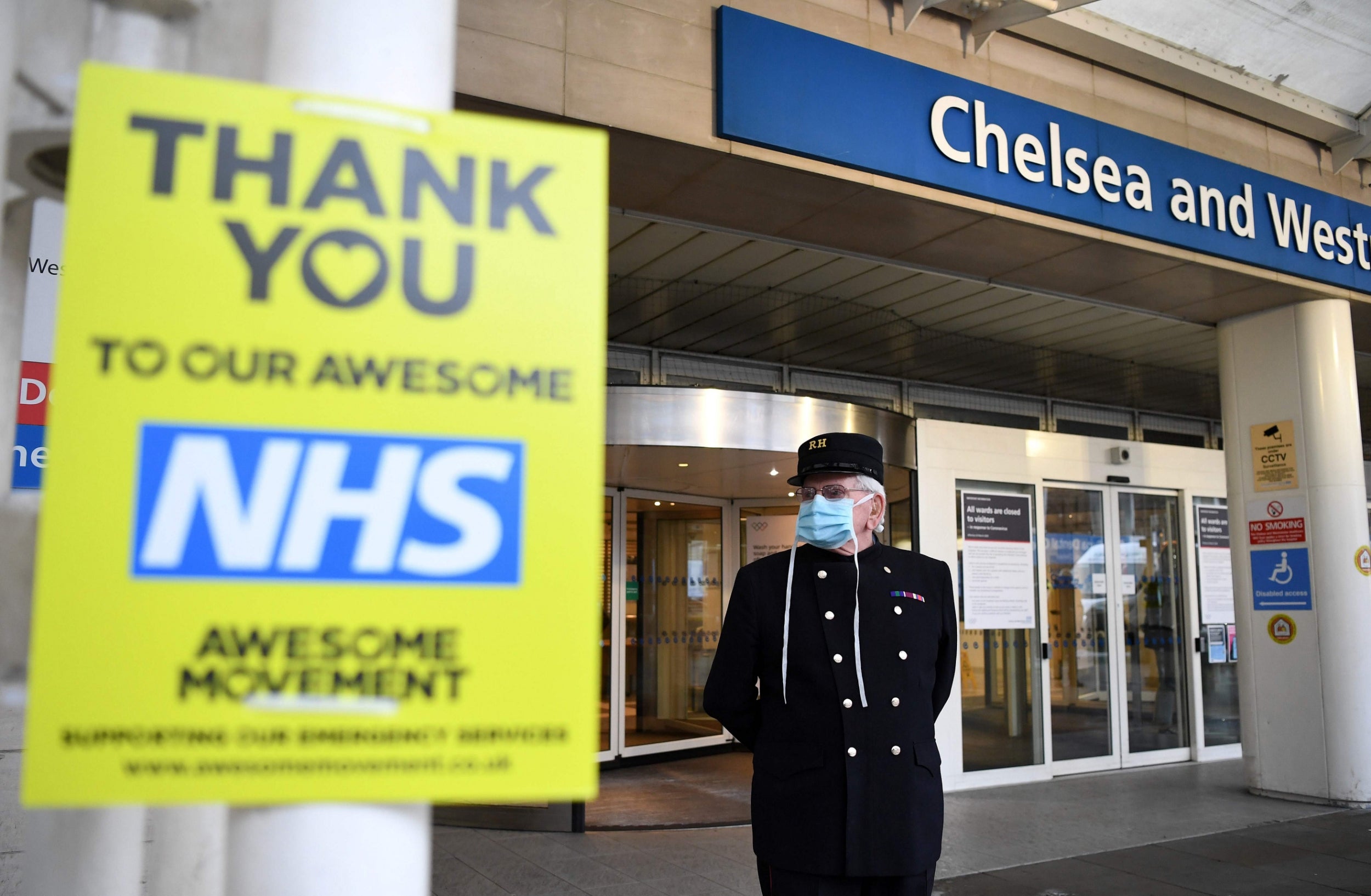
17/30 Chelsea and Westminster Hospital in London
AFP via Getty
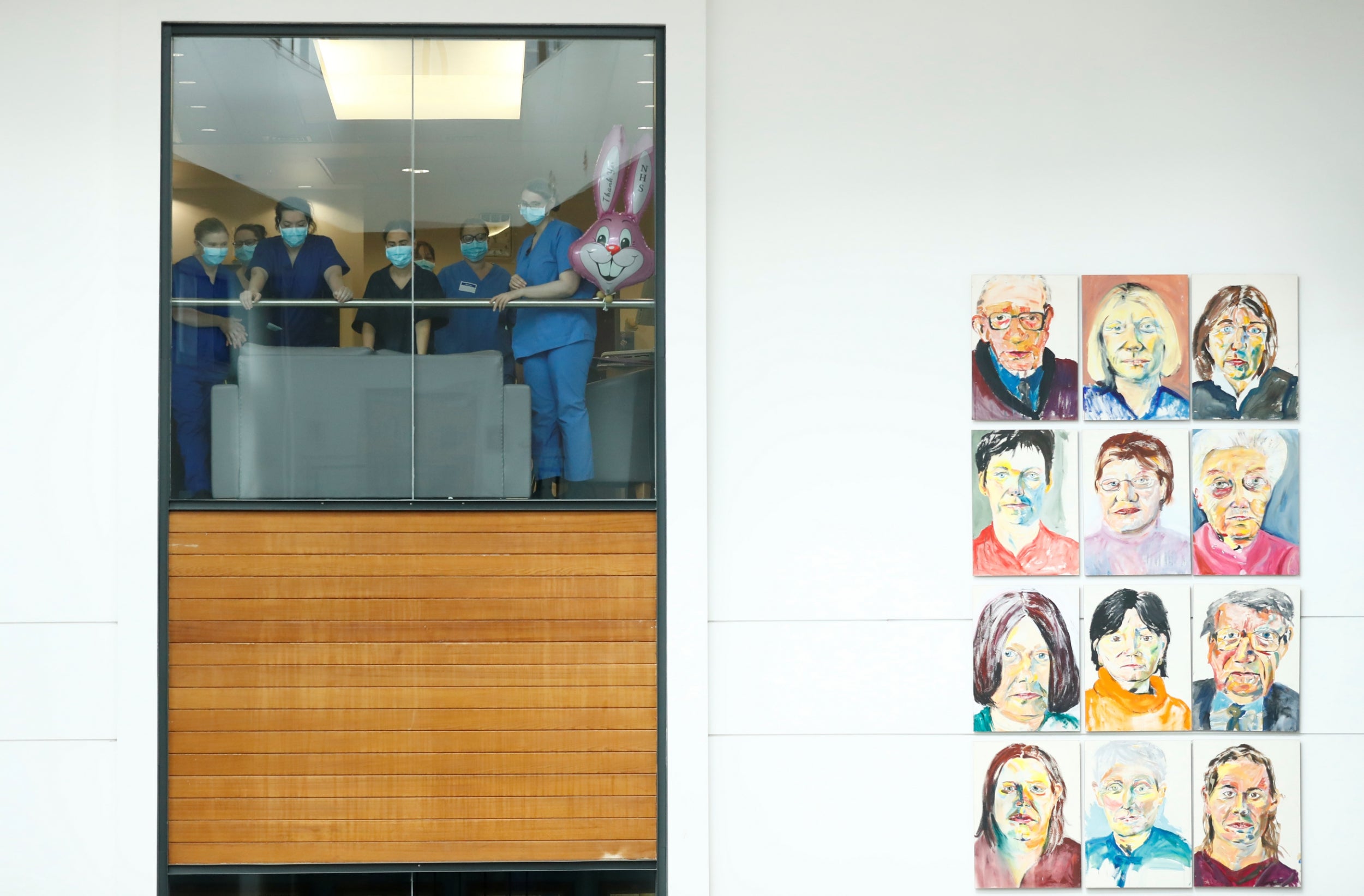
18/30 Belfast, Northern Ireland
NHS staff observe a minutes silence at Mater Infirmorum Hospital
Reuters
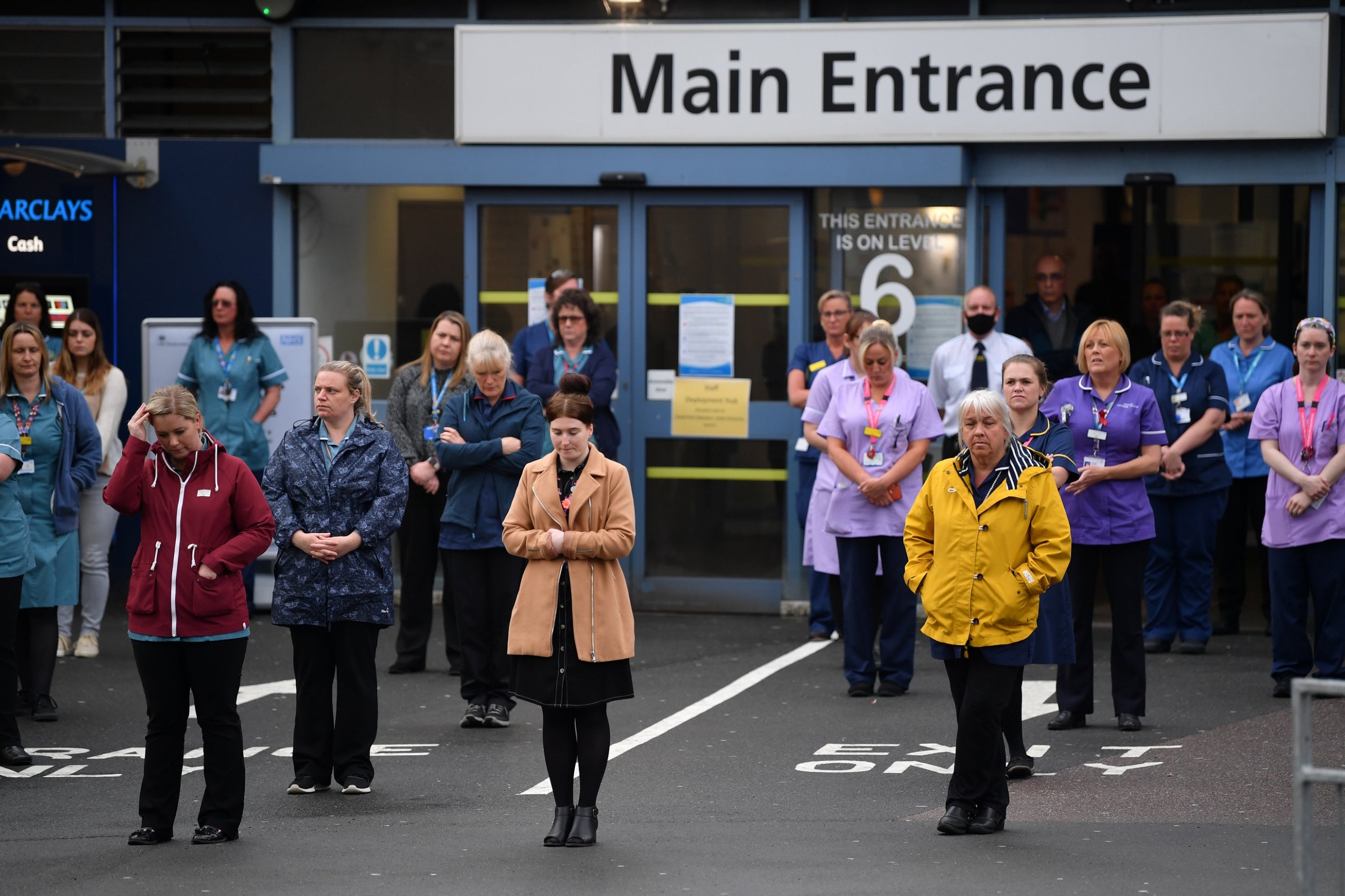
19/30 Plymouth
NHS workers hold a minute’s silence outside the main entrance of Derriford Hospital
Getty
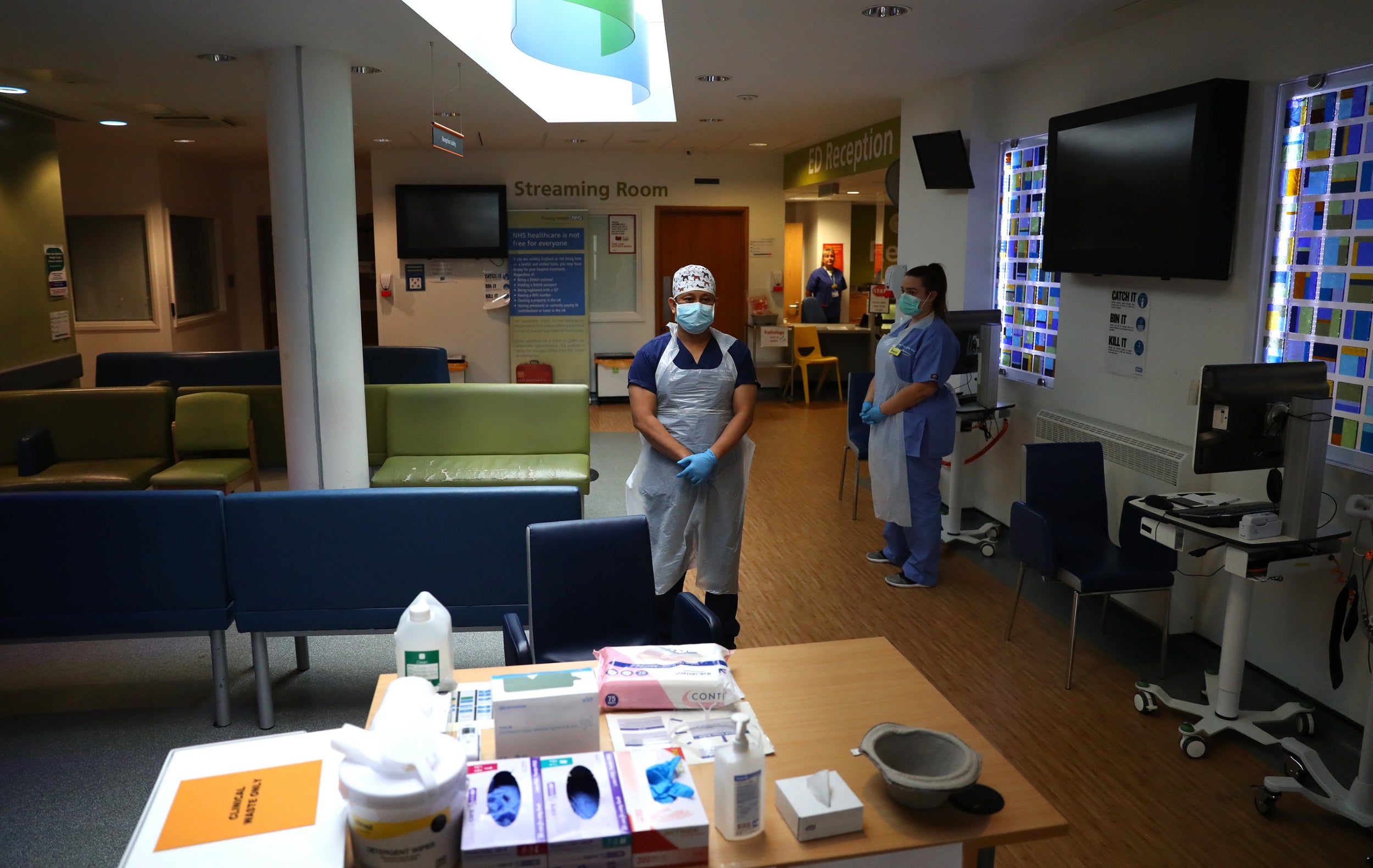
20/30
NHS Frimley Park Hospital staff at the A&E department observe a minute’s silence
Getty
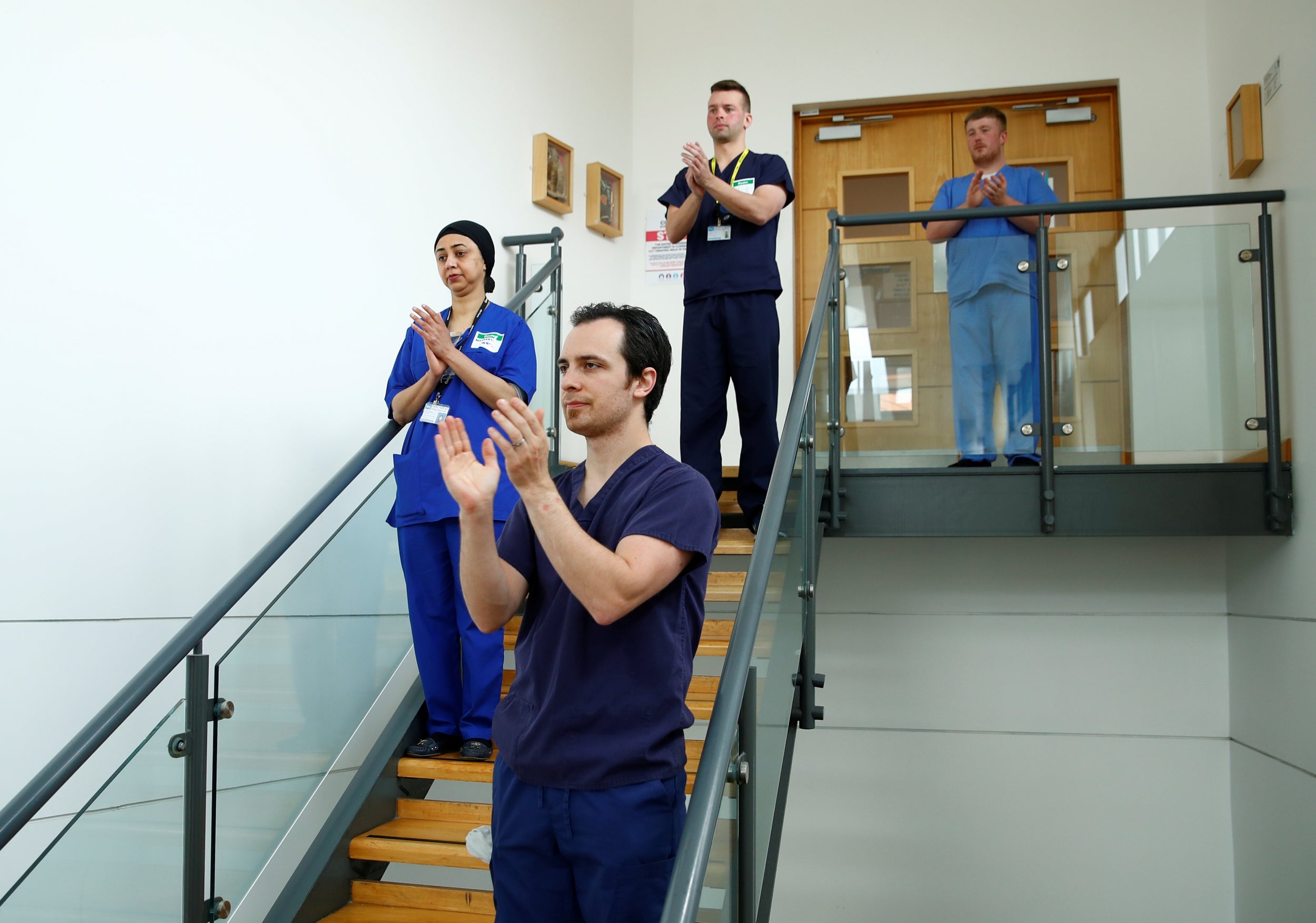
21/30 Mater Infirmorum Hospital
People applaud after a minutes silence in honour of key workers
Reuters
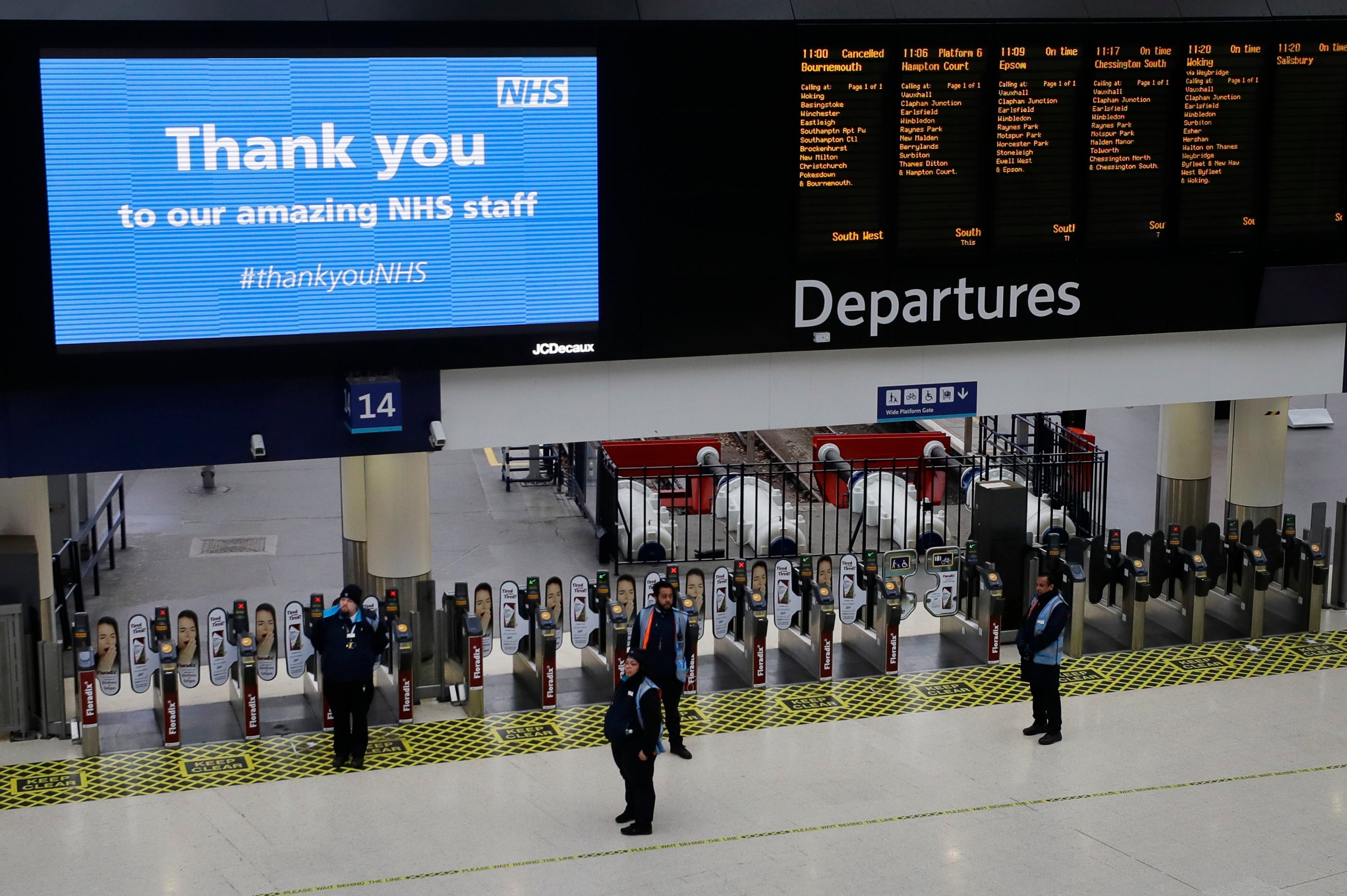
22/30 Waterloo Station, London
AP

23/30
Wreaths laid outside Sheffield town hall
PA
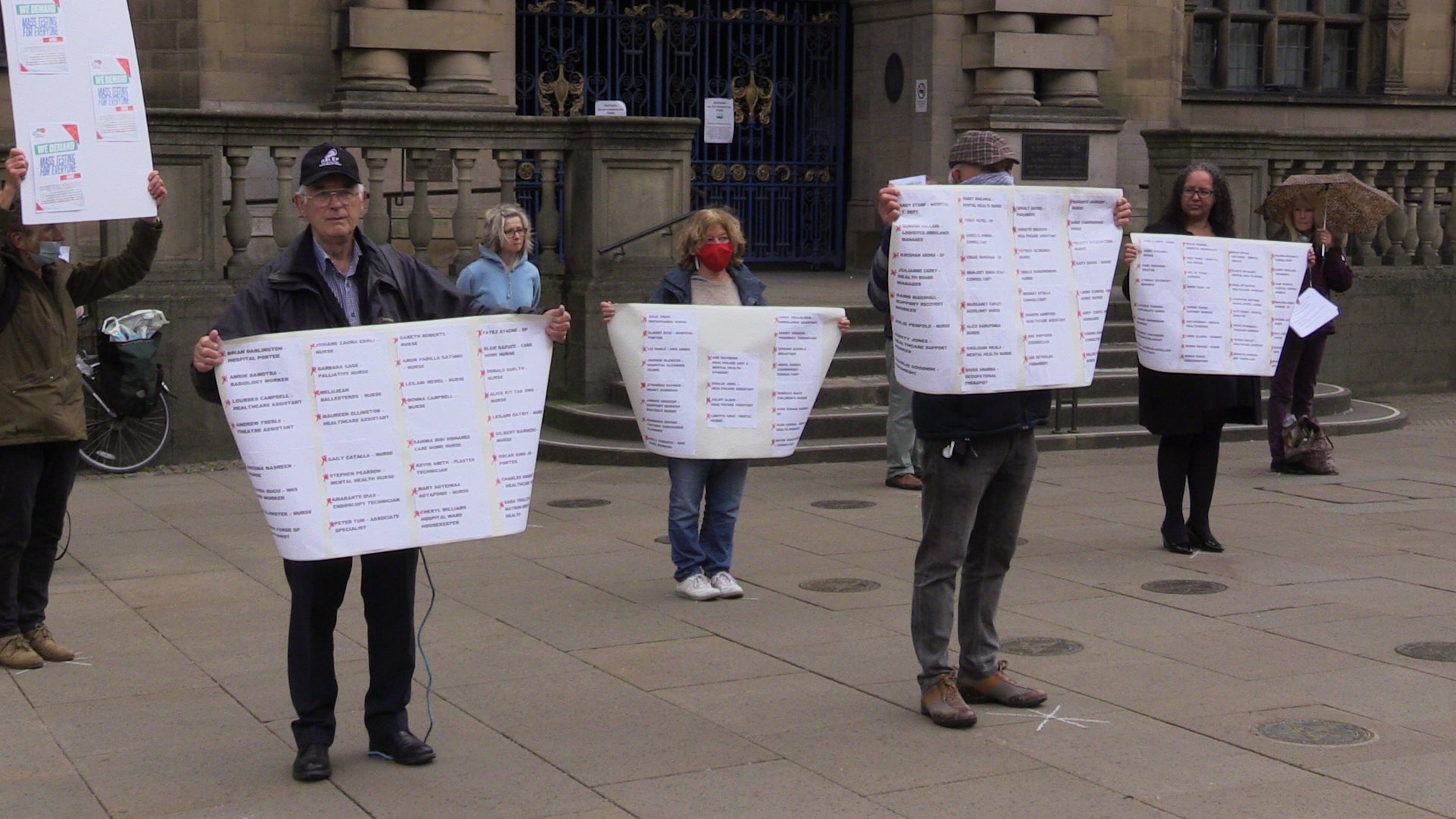
24/30
A group of trade unionists and supporters standing outside Sheffield town hall
PA
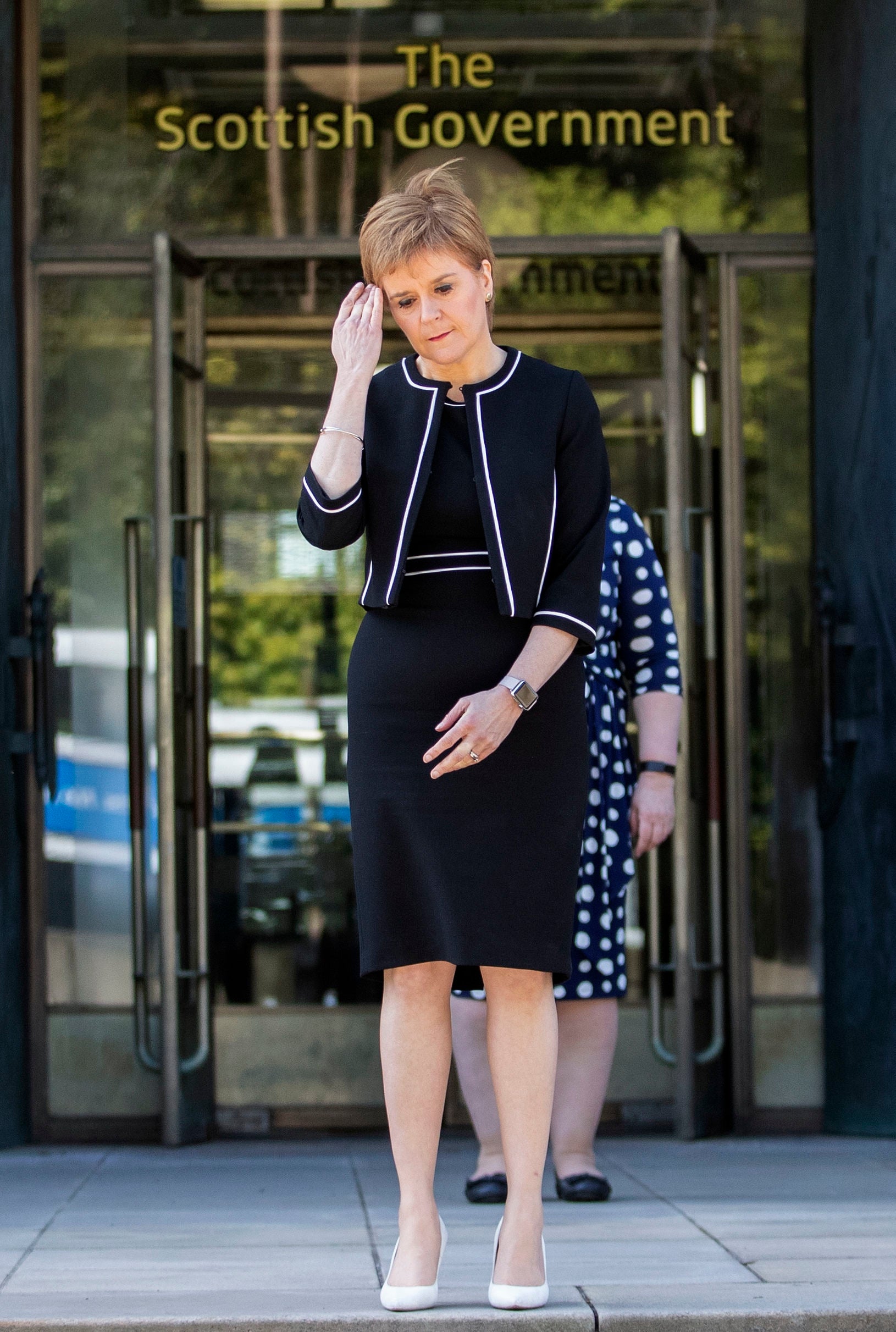
25/30
First Minister Nicola Sturgeon stands outside St Andrew’s House in Edinburgh to observe a minute’s silence in tribute to the NHS staff and key workers who have died during the coronavirus outbreak
PA
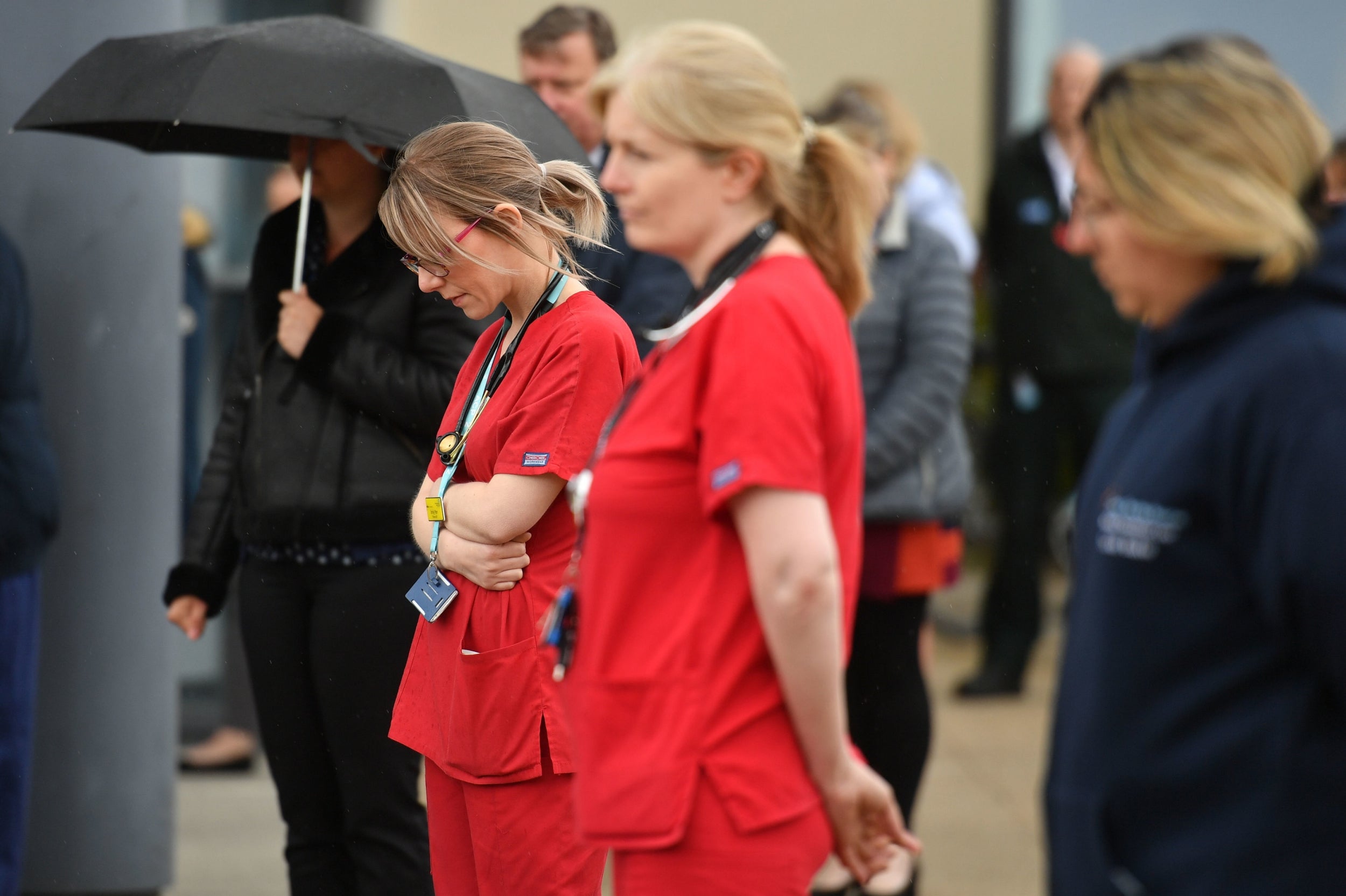
26/30
Staff stand outside the Royal Derby Hospital, during a minutes silence
PA
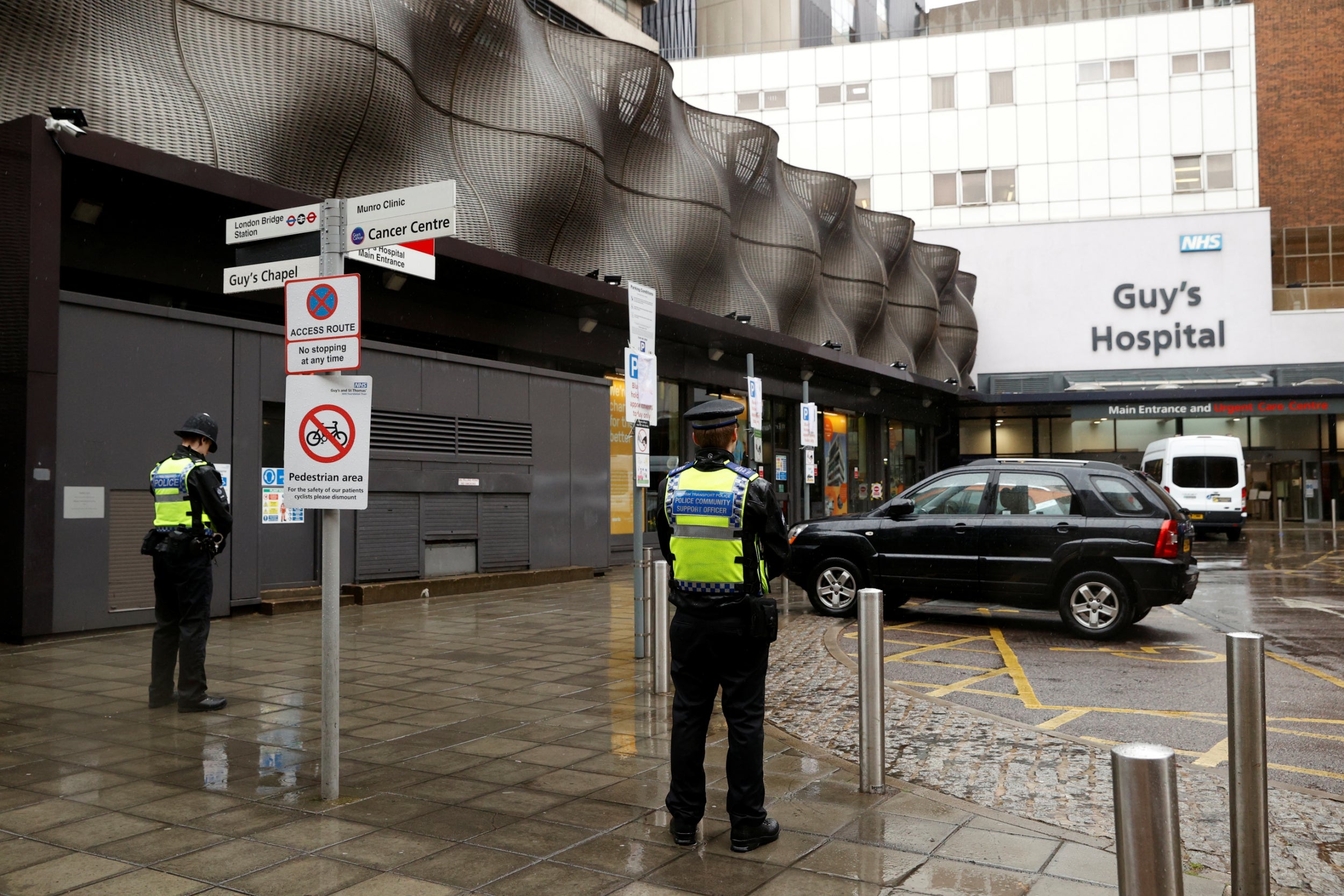
27/30 London
Police officers observe a minutes silence at Guy’s Hospital
Reuters
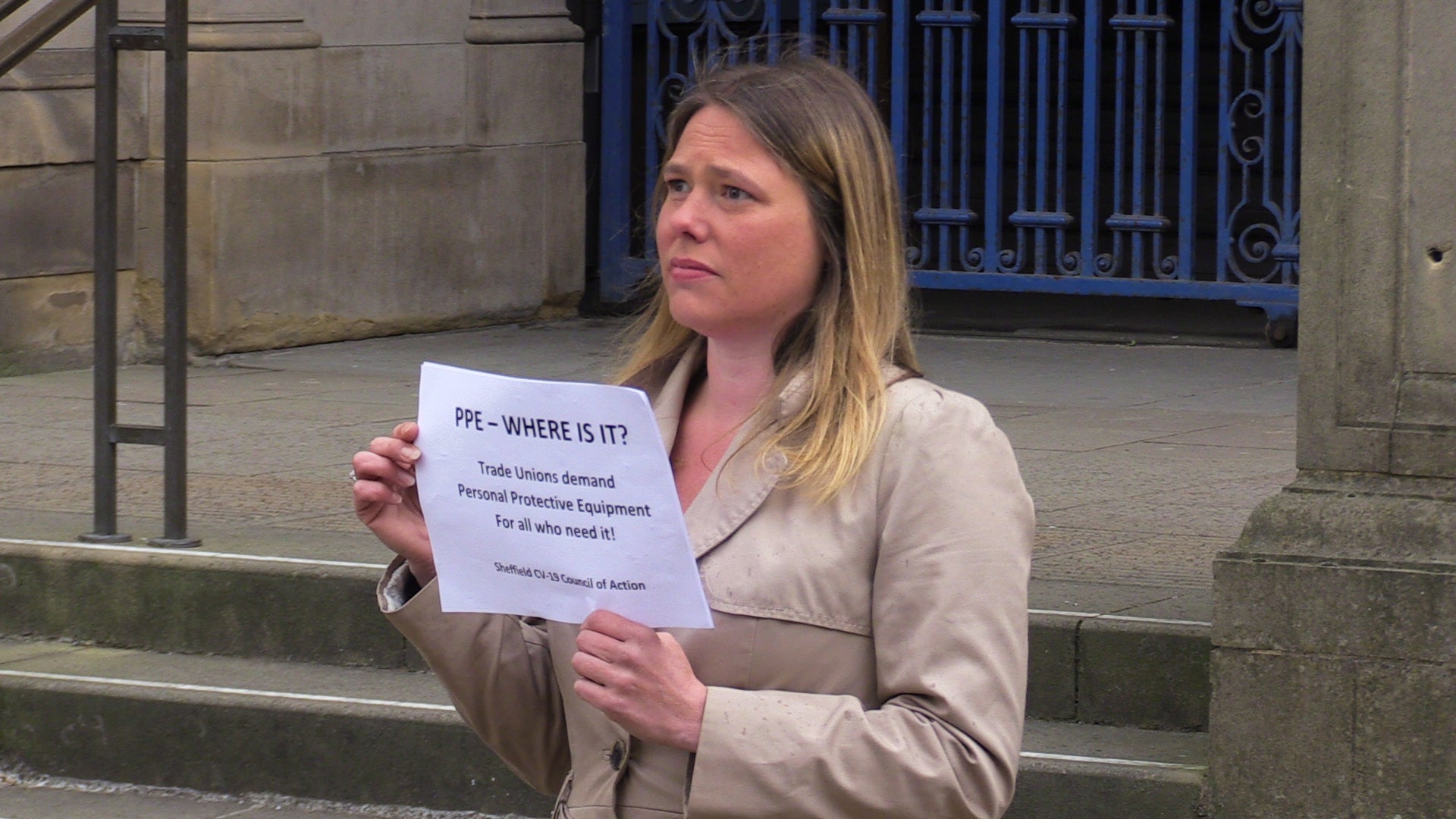
28/30
A woman standing outside Sheffield town hall
PA
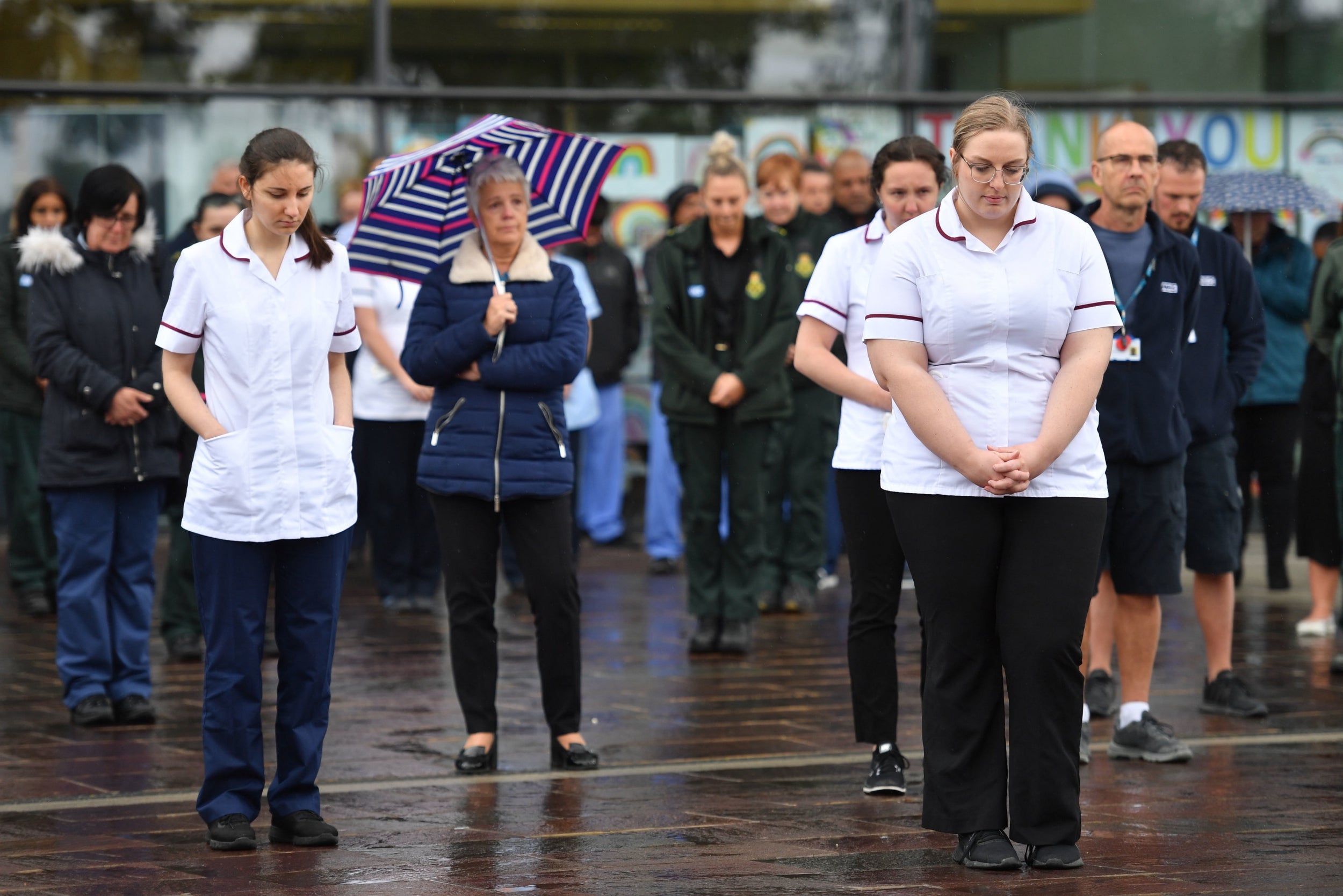
29/30 Royal Derby Hospital
PA
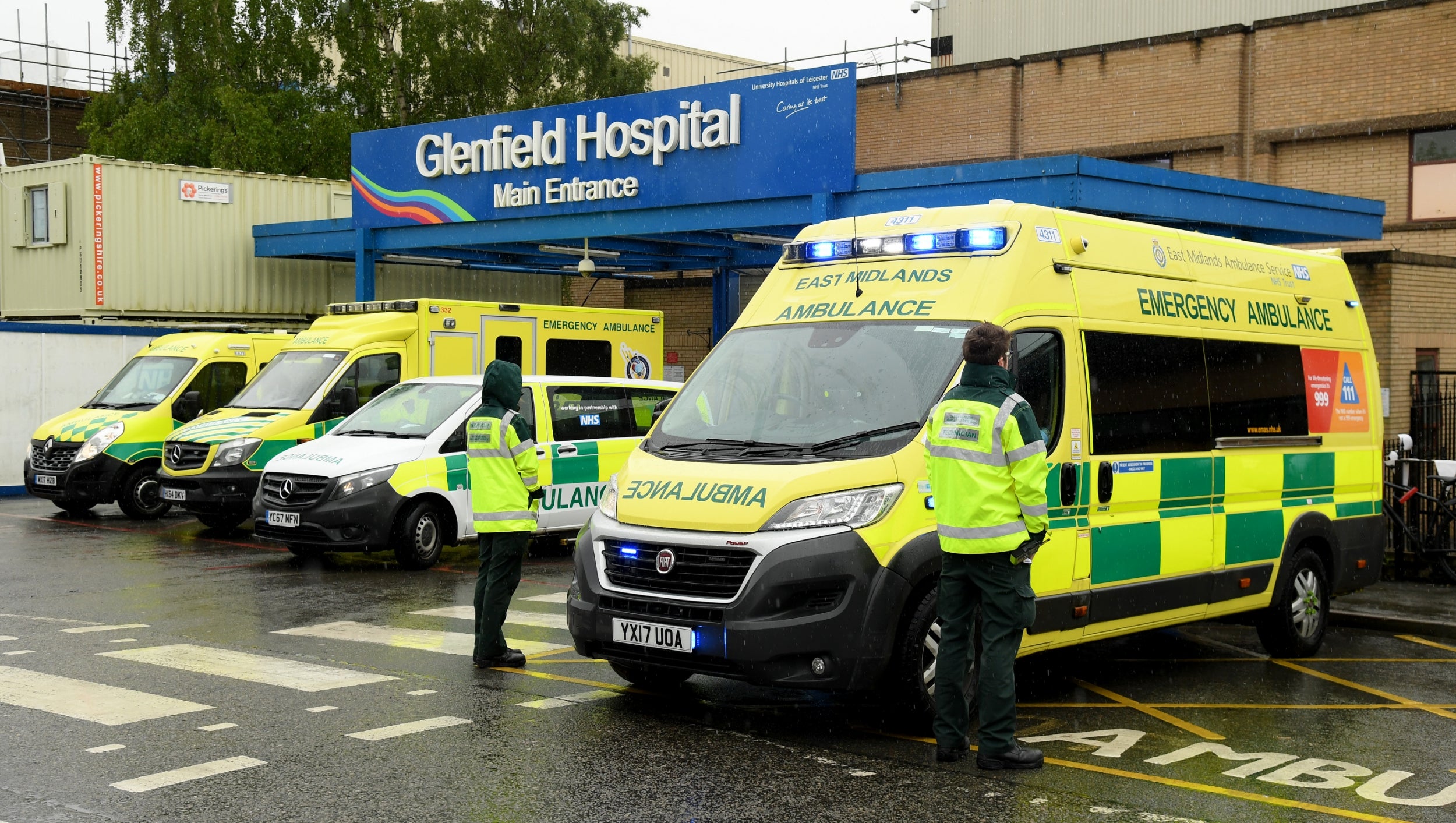
30/30 Leicester,
NHS workers during a minute’s silence outside Glenfield Hospital
Getty

1/30
Staff react outside Salford Royal Hospital in Manchester during a minute’s silence to pay tribute to the NHS staff and key workers who have died during the coronavirus outbreak
PA

2/30
Staff inside Camberwell bus depot in London, during a minute’s silence
PA

3/30
NHS staff at the Mater hospital in Belfast, during a minute’s silence to pay tribute to the NHS staff and key workers who have died during the coronavirus outbreak.
PA

4/30
Shoppers observe a minute’s silence in Tescos in Shoreham
Getty

5/30
Firefighters outside Godstone fire station
PA

6/30 Salford Royal Hospital
Getty

7/30 Salford Royal Hospital
PA

8/30
Hospital workers take part in a protest calling on the British government to provide PPE across Britain for all workers in care, the NHS and other vital public services after a nationwide minute’s silence at University College Hospital in London
AP

9/30
A school children’s poster hanging outside Glenfield Hospital during a minute’s silence
Getty

10/30
A man holds a placard that reads “People’s health before profit” outside St Thomas hospital
Getty

11/30
Staff members applaud outside the Royal Derby Hospital, following a minute’s silence
PA

12/30
Cabinet Secretary Mark Sedwill, Prime minister Boris Johnson and Chancellor of the Exchequer Rishi Sunak, stand inside 10 Downing Street, London, to observe a minutes silence in tribute to the NHS staff and key workers who have died during the coronavirus outbreak
PA

13/30 University College Hospital, London
Hospital workers hold placards with the names of their colleagues who have died from coronavirus as they take part in a protest calling on the British government to provide PPE
AP

14/30
Staff at Waterloo Station in London, stand to observe a minute’s silence, to pay tribute to NHS and key workers who have died with coronavirus
AP

15/30
Medical staff at the Louisa Jordan hospital stand during a UK wide minutes silence to commemorate the key workers who have died with coronavirus in Glasgow
Getty

16/30 London
An NHS worker observes a minute’s silence at Chelsea and Westminster Hospital
Reuters

17/30 Chelsea and Westminster Hospital in London
AFP via Getty

18/30 Belfast, Northern Ireland
NHS staff observe a minutes silence at Mater Infirmorum Hospital
Reuters

19/30 Plymouth
NHS workers hold a minute’s silence outside the main entrance of Derriford Hospital
Getty

20/30
NHS Frimley Park Hospital staff at the A&E department observe a minute’s silence
Getty

21/30 Mater Infirmorum Hospital
People applaud after a minutes silence in honour of key workers
Reuters

22/30 Waterloo Station, London
AP

23/30
Wreaths laid outside Sheffield town hall
PA

24/30
A group of trade unionists and supporters standing outside Sheffield town hall
PA

25/30
First Minister Nicola Sturgeon stands outside St Andrew’s House in Edinburgh to observe a minute’s silence in tribute to the NHS staff and key workers who have died during the coronavirus outbreak
PA

26/30
Staff stand outside the Royal Derby Hospital, during a minutes silence
PA

27/30 London
Police officers observe a minutes silence at Guy’s Hospital
Reuters

28/30
A woman standing outside Sheffield town hall
PA

29/30 Royal Derby Hospital
PA

30/30 Leicester,
NHS workers during a minute’s silence outside Glenfield Hospital
Getty
The report warned that the UK remains in a “critical” stage of its battle with coronavirus, with the pandemic still growing in some parts of the country.
And it was scathing about the test and trace system for England led by Conservative peer Dido Harding, which involves private contractors providing 25,000 tracers to get in touch with contacts and tell them to go into isolation in their own homes.
The virus will only be contained if 80 per cent or more of contacts of infected people are traced and isolated, and this “is clearly not happening” under the Harding scheme, the report said.
It condemned the system as “untested and being operated by companies with no experience in this area”, pointing out that Lady Harding herself has told parliament it will not be fully functional until September. And it called for it to be radically restructured, with responsibility handed over to local public health directors.
The scientists also criticised the “apparent failure” of the NHSX smartphone app – designed to alert people if they have been within two metres of a Covid sufferer – which has not been rolled out nationwide following a troubled trial on the Isle of Wight.
The latest news on Brexit, politics and beyond direct to your inbox
“Importantly this was one of the many areas that the UK went its own way taking an approach that was very different to other countries,” the report said.
The report included criticism from the government’s own Scientific Advisory Group on Emergencies (Sage) about the inaccuracy of home swabbing and the high number of false negatives which the programme has produced.
The system can only work with sufficient access to rapid testing, but there are “multiple concerns” that this is not available in England, it said.
The Independent Sage group called for the government to draw on the experience of New Zealand, which has successfully eliminated coronavirus, to develop a more integrated “find, test, trace, isolate and support’ model.
Such a programme would be embedded within existing healthcare networks using local authority and NHS professionals with robust accountability mechanisms.
And it would provide a comprehensive support package for contacts asked to self-isolate, including material support, a place to stay and guarantees that they will be able to return to work.
Prof Sir David King said: “The government has placed huge emphasis on their test, track and trace system in recent weeks, even labelling it ‘world beating’.
“It is clear from our research that this simply isn’t the case, indeed the system as it stands is not fit for purpose.
“This is the critical moment for the government to act now or risk further spikes.
“We believe that a new approach is required, one that moves away from a centralised system that utilises a ‘local first’ approach. We are calling on the government to urgently rethink their course to ensure that we have a system in place that will help and not hinder the country’s recovery.”


